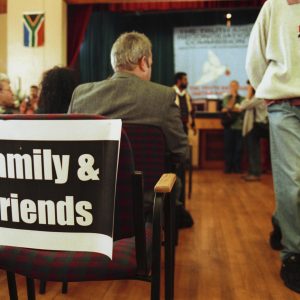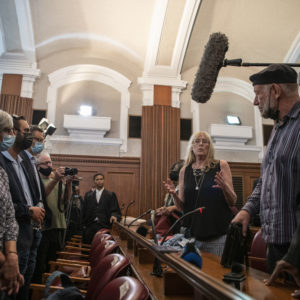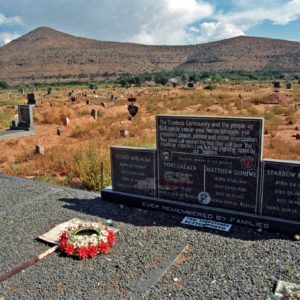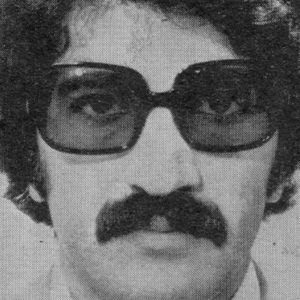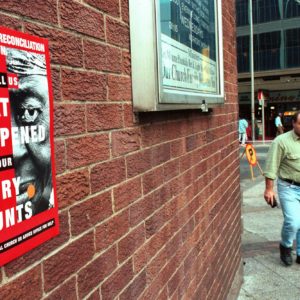Apartheid persecutors deserve at least a sullied name
Neil Aggett and Ahmed Timol’s families have the closure they sought. But with many TRC-related cases outstanding, more must be done before the perpetrators die.
Author:
18 March 2022

When Judge Motsamai Makume made the finding that anti-apartheid activist Neil Aggett did not commit suicide and was murdered by members of the apartheid security police, his sister Jill Burger “burst into tears and cried, probably for a couple of hours after that”.
She was alone in her home in England, watching the live stream of the verdict in the reopened inquest into her brother’s death in 1982. Before the judgment, she had prepared for the possibility that the judge might rule her brother’s death – as his original legal team, led by advocate George Bizos argued – an “induced suicide”.
But Burger says that “having sat through the first weeks of cross-examination, I had watched the judge and he was very alert to some of the nuances and asked some very pertinent questions”. Because of this, she was “full of hope” that he would rule Aggett’s death a murder. “Also, our lawyers put up some incredibly honest and truthful facts that couldn’t be disregarded, really, and I think the judge absorbed those facts.”
Related article:
Like her father Aubrey Aggett, who died in 1996, Burger “always believed it was murder … I think that Makume felt that Neil as a person and with what he stood for would not have committed suicide, and I was tremendously pleased about that.”
She says the judgment has offered her some sort of closure. “The truth, which I’ve always believed, has been confirmed and I feel happier about that. I’m just very, very sorry that the other members of my family aren’t here to know about it. That’s sad. Particularly my parents. They were so heartbroken when the first inquest absolved the police completely and they saw no justice in that at all.”
Burger does wonder though why it took so long to arrive at Makume’s findings. Allegations of political interference in the prosecution of Truth and Reconciliation Commission (TRC) cases have led her to believe that “there must have been some sort of agreement during the transfer of power from the Nationalist government to the ANC that they agree to turn a blind eye to criminal activities on both sides”.
Related article:
The Aggett matter is only the second TRC-related case to be ruled on since 1994. In 2017, Judge Billy Mothle overturned the original verdict of suicide in an apartheid-era inquest into the death of Ahmed Timol. Both Mothle and Makume chose not to address the question of political interference when handing down their judgments.
Burger says that she would have loved some accountability, but both of her brother’s chief interrogators died before a decision to reopen the inquest was made.
“There were very, very strong arguments to reopen this inquest for 10, 15 years. But it wasn’t and there’s never been an explanation. It’s going to be interesting to see if all the other victims of similar crimes will get a hearing one day or again wait until perpetrators have died. It’s very frustrating and you would think that in the new democratic South Africa that these things could be done. It was promised to the TRC that they would be looked at and that promise has not been kept.”
The complicity of courts
Lukhanyo Calata says he and the other family members of the Cradock Four are “obviously very pleased about the judgment in the Aggett matter. It primarily reinforces what we know – our people were killed under apartheid and the courts were complicit in allowing those crimes to be perpetrated.
“Where the Aggett family find themselves now is where we were in 1994. We hope that these prosecutions will not be delayed for 27 or 28 years, and that they’re swift and those implicated will be dealt with almost immediately.”
Makume recommended that the National Prosecuting Authority (NPA) investigate the former security policemen involved in interrogating Aggett and covering up his death with a view to prosecution. But he did not spell out who should be prosecuted and for what crimes.
Related article:
It seems likely that were the NPA to pursue prosecutions against Nicolaas Deetlefs, Joseph Woensdrecht and others, it would be for their involvement in the cover-up and for perjury at the reopened inquest. The NPA said after the verdict that it is studying the judgment to decide on a course of action.
Foundation for Human Rights (FHR) director Yasmin Sooka commended Makume for the thoroughness of his judgment, but feels his decision not to address the issue of political interference was “a big failure, not to speak about how the delays affect the rights of families to justice and that in itself is a violation of their rights”. She said it is unfortunate that Makume’s judgment “stops short of saying who should be investigated and what for, whereas Mothle did go a lot further on that score” in the Timol judgment.
A frail and heavily medicated Deetlefs gave evidence at the reopened inquest last year of his involvement in Ernest Dipale’s death. The young activist was also found hanging in his cell at John Vorster Square police station, just six months after Aggett. Sooka said it may well turn out that Deetlefs does not live long enough to face any Aggett-related charges in court, but that the FHR believes “even though it may be symbolic, it’s critical that someone like Deetlefs and the other remaining security branch operatives who are alive are at least indicted. They may not live to survive a trial but it’s also about truth, recovery and joining those dots together. He was a terrible man and that should be exposed, irrespective of his health and all of those issues.”
‘A common thread’
For Ahmed Timol’s nephew Imtiaz Cajee, who has spent almost three decades seeking justice for his uncle, the Aggett judgment is not surprising.
“The security police claimed that Timol and Aggett had committed suicide, and that they had implicated their comrades and taken their own lives because of those confessions. As Makume correctly outlined, their allegiance continues to be to the so-called old guard and the old system,” he said.
“They’re not prepared to speak the truth and they perjure themselves under oath. For me, that’s a common thread that runs all the way from the death of Looksmart Ngudle in 1963, all the way through the approximately 72 detainees who died in detention. They said they never laid a finger on them and that they were well looked after. We know the reality and the reality is that there was open collusion between the security police, the state pathologists and the magistrates that presided over these inquests.”
Related article:
Makume referred to some of the conclusions of magistrate Petrus Kotze, who presided over the first Aggett inquest and led the state’s evidence in the first Timol inquest, as “disgusting, speculative and nonsensical”.
Like most members of the apartheid-era magistracy – who as a group were invited to explain their role in the treatment of political detainees and their rulings in death-in-detention inquests to the TRC but declined to do so – Kotze was never held accountable for his actions. He died long before the Aggett inquest was reopened.
Proper foundations
Burger was not surprised at Kotze’s finding or the criticism of it by Makume. “When you lived in South Africa under the apartheid regime, one was very conscious that the state was against you. We knew that the original inquest was underhanded and the chance of any sort of judgment making any sort of statement that denied what the police said was very, very unlikely.”
Makume has yet to deliver his judgment in the Dipale inquest. Closing arguments are still to be concluded in the Hoosen Haffejee inquest. And the long-delayed trial of former Security Branch members for their role in kidnapping and murdering activist Nokuthula Simelane resumes in May.
Cajee’s search for justice was ended cruelly with the death of Joao Rodrigues, the last remaining witness to his uncle’s final hours. He said the broader problem of political interference and delays in these prosecutions should not be allowed to remain unresolved.
Related article:
Those in government have implored him to “forget the past. It’s not good for the country, it’s not good for the economy, it’s not good for the ruling party.” But he and other family members of apartheid-era victims are willing to forget the past only “if we get alleged perpetrators to come forward and make full disclosure. Then we can demonstrate honestly that there’s a genuine will from both sides to forget the past, and for us to build and to make sure that we don’t go back down that torrid path that we were on for years where people lost their lives. Then we can build a proper foundation based on trust and honesty and move forward.”
Burger says Makume’s judgment offers her family closure, and while prosecutions may not succeed and the perpetrators escaped accountability through death, she still wants them to be exposed.
“Stephan Whitehead and Arthur Cronwright’s names should be mentioned at any opportunity. May their families know who they were. I’m very eager for that to be the case. The people who worked with them, knew them, befriended them should know who they really were and what they did.”

